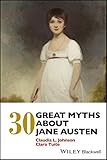30 great myths about Jane Austen / Claudia L. Johnson, Clara Tuite.
By: Johnson, Claudia L [author]
Contributor(s): Tuite, Clara [author]
Language: English Publisher: Hoboken, NJ: Jon Wiley & Sons, Inc., ©2020Description: 1 online resource (224 pages)Content type: text Media type: computer Carrier type: online resourceISBN: 9781119146896Other title: Thirty great myths about Jane AustenSubject(s): Austen, Jane, 1775-1817 -- Criticism and interpretation | Austen, Jane, 1775-1817 | Literary criticism -- European -- English, Irish, Scottish, WelshGenre/Form: Electronic books.DDC classification: 823.7 Online resources: Full text available at Wiley Online Library Click here to view| Item type | Current location | Home library | Call number | Status | Date due | Barcode | Item holds |
|---|---|---|---|---|---|---|---|
 EBOOK
EBOOK
|
COLLEGE LIBRARY | COLLEGE LIBRARY | 823.7 J6308 2020 (Browse shelf) | Available | CL-51153 |
Browsing COLLEGE LIBRARY Shelves Close shelf browser

|

|

|

|

|
No cover image available |

|
||
| 823.7 An74 2000 Sense and sensibility / | 823.7 An74 2000 Sense and sensibility / | 823.7 Au74 1989 Pride and prejudice / | 823.7 J6308 2020 30 great myths about Jane Austen / | 823.73 Sco86 1962 Ivanhoe / | 823.73 Sco86h 1996 The heart of Mid-Lothian / | 823.8 B789 2000 Wuthering heights / |
Claudia L. Johnson is the Murray Professor of English at Princeton University. She specializes in Eighteenth-Century and Nineteenth-Century British literature, and gender studies. Renowned for her works on Jane Austen and Mary Wollstonecraft, Johnson's books include Jane Austen: Women, Politics, and the Novel; Equivocal Beings: Politics, Gender and Sentimentality in the 1790s; and Jane Austen's Cults and Cultures, which won the Christian Gauss Award.
Clara Tuite is Professor of English at the University of Melbourne, a Co-Director of the Enlightenment, Romanticism and Contemporary Culture Research Unit, and a Fellow of the Australian Academy of the Humanities. Her books include Romantic Austen: Sexual Politics and the Literary Canon and Lord Byron and Scandalous Celebrity, which was awarded the Elma Dangerfield Prize by the International Association of Byron Societies.
Abbreviations and Note on the Text viiAcknowledgements viiiIntroduction xiMyth 1 Jane Austen had no interest in fame 1Myth 2 There is no sex in Jane Austen's novels 7Myth 3 Jane Austen wrote on little bits of ivory 14Myth 4 Jane Austen's juvenilia are scraps which she outgrew 19Myth 5 Jane Austen's novels are naturalistic 27Myth 6 Jane Austen was unconscious of her art 34Myth 7 Northanger Abbey is a spoof on Gothic fiction 43Myth 8 The Bath Jane Austen knew and loathed 49Myth 9 Jane Austen's writing is easy to understand 56Myth 10 Sense and Sensibility is a satire on sensibility 61Myth 11 Jane Austen was the best-selling novelist of her time 66Myth 12 Regency Austen 72Myth 13 Only women read Jane Austen 80Myth 14 As Pride and Prejudice shows, all Austen's novels are love stories 85Myth 15 Jane Austen never mentions the war 93Myth 16 Something happened to Jane Austen when she wrote Mansfield Park 101Myth 17 Jane Austen disapproved of the theater 107Myth 18 Jane Austen was a Christian moralist 114Myth 19 In Emma, Jane Austen created a heroine no one but an author would love 120Myth 20 Jane Austen and the amorous effects of brass 128Myth 21 Persuasion is an autumnal novel 134Myth 22 Jane Austen was a feminist/Jane Austen was not a feminist 141Myth 23 Jane Austen's letters are mean and trivial 147Myth 24 Jane Austen was anonymous 155Myth 25 Jane Austen's novels depict the traditional world of the aristocracy 160Myth 26 Jane Austen was a comic novelist 168Myth 27 Jane Austen's novels are about good manners 174Myth 28 Jane Austen's muslins 179Myth 29 Jane Austen writes escape fiction 187Myth 30 Jane Austen was a star-crossed lover 193Further Reading 200Index 203
A fascinating look into the myths that continue to shape our understanding and appreciation of Jane Austen.
Was Jane Austen the best-selling novelist of her time? Are all her novels romances? Did they depict the traditional world of the aristocracy? Is Austen’s writing easy to understand? Well into the 21st century, Jane Austen continues to be one of the most compelling novelists in all English literature. Many of her ideas about class, family, history, intimacy, manners, love, desire, and society, have inspired “myths” that are often contradictory — she was a Tory who was also a liberal feminist, or, her novels are at once sharply satirical and unapologetically romantic. Myths, like Austen’s works, are dynamic, changing over time and impacting how we read and interpret literature.
30 Great Myths about Jane Austen examines the accepted beliefs — both true and untrue —that have most influenced our readings of Austen. Rather than simply de-bunking, or validating, commonly-held views about Austen, authors Claudia L. Johnson and Clara Tuite explore how these myths can be used to engage with the life, work, and reception of Jane Austen. Applying the most up-to-date scholarship to better understand how myths shape our appreciation of Jane Austen, this fascinating volume:
Introduces readers to the history of Austen reception, both in academic scholarship and in the general public
Examines Jane Austen’s life and letters, her historical contexts, her texts, and their afterlives
Discusses Austen’s influence on the development of literary criticism as a discipline
Explores each of Austen’s main novels, as well as relatively obscure texts such as Sanditon and The Watsons
Offering engaging narrative and original insights, 30 Great Myths about Jane Austen is a must-read for scholars, instructors, and students of English and Romantic literature, as well as general readers with interest in the life and works of Jane Austen.

There are no comments for this item.